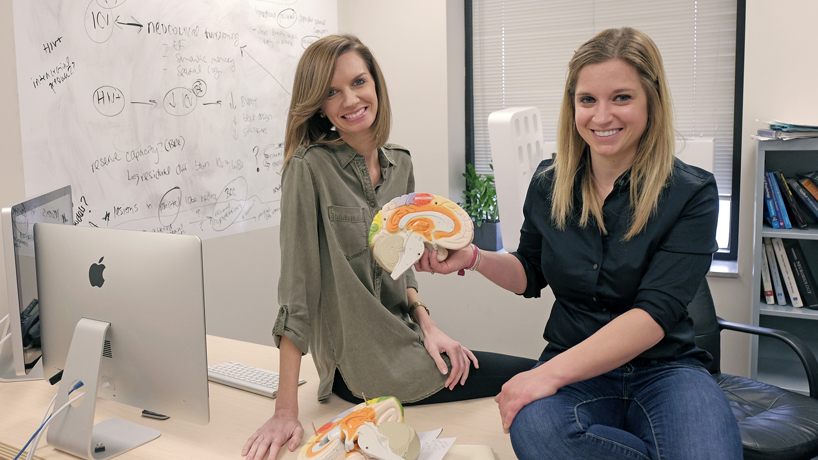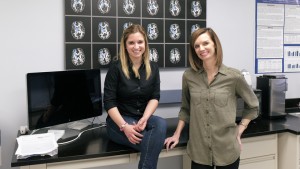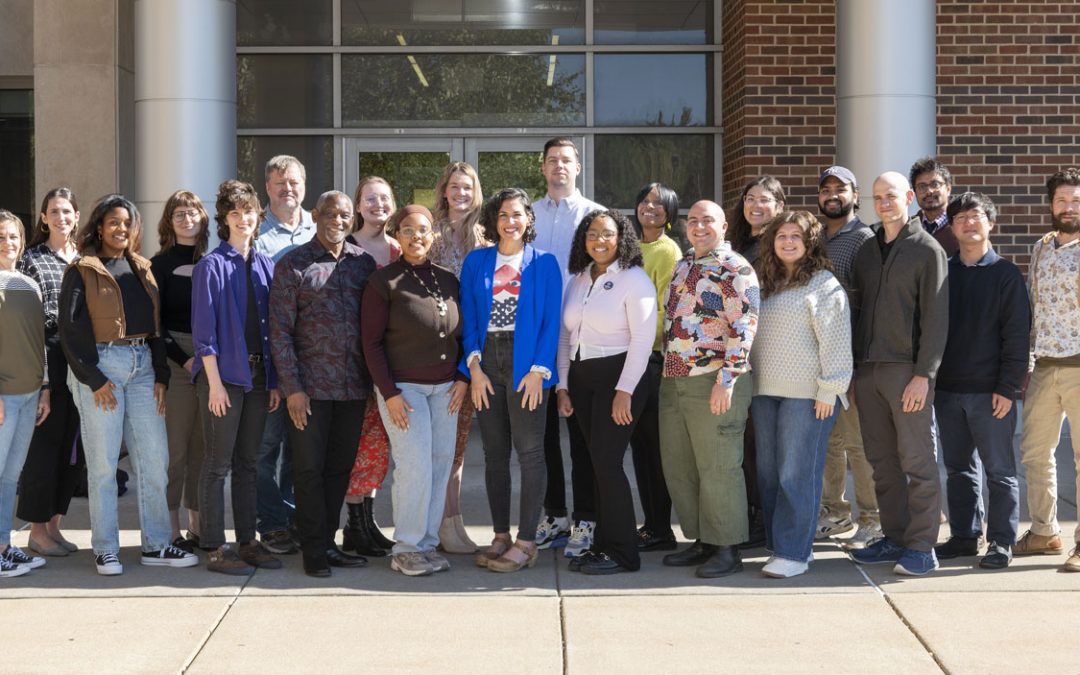
Behavioral Neuroscience PhD candidates Lauren Salminen (at left) and Laurie Baker research brain functioning using various complex scientific techniques. (Photos by August Jennewein)
Laurie Baker and Lauren Salminen agree that the road to becoming an independent neuroscience researcher is labor intensive, to say the least.
As they work through their graduate program in Behavioral Neuroscience at the University of Missouri–St. Louis, Baker and Salminen have had to juggle an ever-expanding set of skills.
One day might be devoted to grant writing while another day could be all about neuroimaging interpretation.
“I didn’t realize when I first started how much you need to know about physics, biology, radiology…,” said Salminen. “You learn a ton training in different areas, but it can get remarkably complex and difficult.”

Interpreting neuroimaging slides like the ones seen behind Salminen and Baker is one of the skills they are mastering in the course of their research and training.
Difficulty could not deter Salminen or Baker, and eventually persistence paid off. In May 2015, both graduate students were awarded National Institutes of Health predoctoral training grants.
Baker was awarded $55,808 from the National Institute of Mental Health to research how early life stress impacts neural abnormalities and cognitive dysfunction in individuals with human immunodeficiency virus.
And Salminen was awarded $96,343 from the National Institute on Aging to research how genetic risk factors for reduced antioxidant defense in the brain influence brain structure and cognitive function among healthy older adults.
For Baker, taking those first, big steps toward becoming a fully independent researcher was the fulfillment of a high school dream.
“When I came to UMSL and took a biological psychology class with Dr. Rob Paul, all of the interest in psychology I had developed in high school streamed back to me, and it pushed me to change my major from nursing to psychology. It can be scary to actually pursue what you want.”
Baker flourished after overcoming her hesitations. Now in her last year of graduate school, besides pursuing advancements in neuroscience, she also teaches undergraduate sections of biological psychology and hopes to encourage the next wave of researchers.
Baker and Salminen point to their adviser Rob Paul, director of Missouri Institute of Mental Health, as a continuous source of encouragement and guidance, whose approach to training in research has given them valuable skill sets.
“The specific skills I prioritize include creative conceptualization of novel research questions that are meaningful and hold high potential to impact the human condition,” Paul said. “My focus on creative conceptualization and effective writing is fairly relentless, and not all students have the fortitude to thrive in the intense training environment. When they do, like Lauren and Laurie, their success can be readily measured by peer-reviewed publications and federal grant awards.”
From beginning to end, the process of obtaining the grants has been an exhaustive two-year process for Salminen and Baker.
“Only the top 50 percent of NIH grant applications actually get reviewed by a panel of experts in a range of fields like biochemistry, biology, chemistry and genetics ,” said Salminen. “After that, you’ll have rounds of revisions, but it feels good once you make it past those thresholds. About 25 percent of proposed predoctoral grants were funded last year. I can definitely say that the ability to have obtained these grants would never have been possible without the extensive grant-writing training we received from Dr. Paul.”
In the face of challenging odds, Baker feels grateful to have a chance at professional advancement and work that benefits the human condition.
“It’s huge honor to be funded by the National Institutes of Health. I put a lot of work into this grant proposal, and now I’m able to fund my own salary and tuition,” she said. “I can make good on my really deep desire to make an impact on people, a desire I think everyone has. It’s what drives us to wake up in the morning.”















